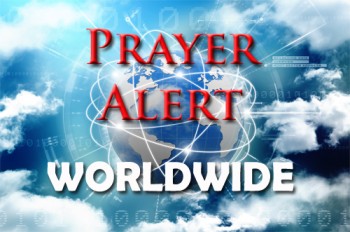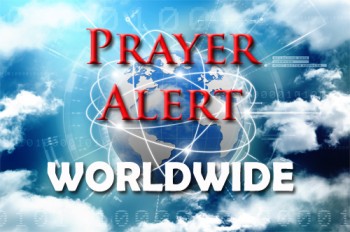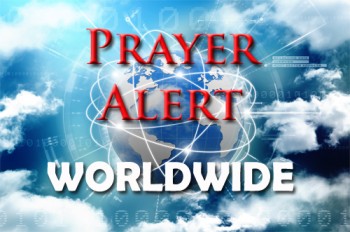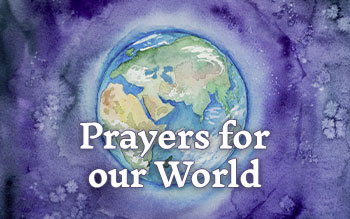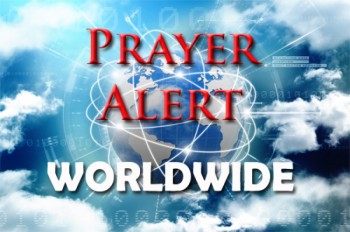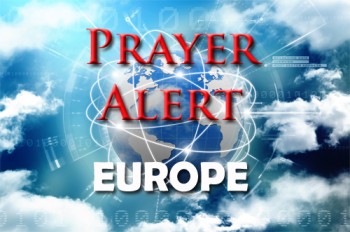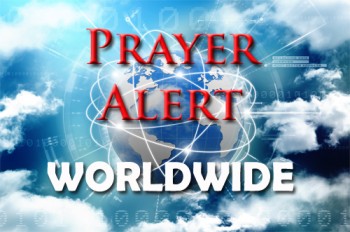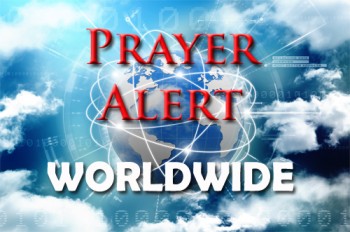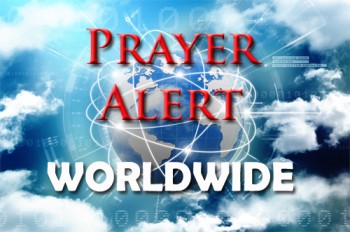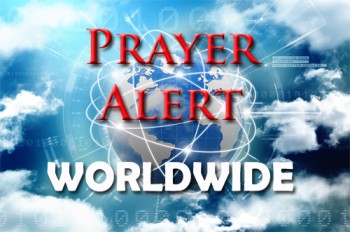Displaying items by tag: Africa
Nigeria: Catholics march against violence
On 1 March, despite heavy rain, many Catholics took a stand against a surge of Islamist extremist violence. The faithful marched the streets of Abuja against the rising wave of insecurity and killings in every part of Nigeria. They carried placards demanding a better and safer society. Some have reported that the numbers of protesters were in their thousands. The president of the Catholic Bishops’ Conference slammed the government for not doing enough to bring those behind these crimes to book. He said, ‘May we once again remind all the arms of government in Nigeria and all whose responsibility it is to protect Nigerians that without security there can be no peace.’
Africa: coronavirus prevention action
On 15 February WHO prioritised support for thirteen African countries whose fragile health systems are already overwhelmed. It is critical to detect coronavirus early to prevent spreading within communities without the treatment capacity. Since 3 February African countries have been receiving technical guidance and advice on how to limit human-to-human transmission, so that they isolate and provide appropriate treatment to affected people. An Africa task force has been working with the WHO, screening points of entry, controlling in health-care facilities, advising on infection prevention and clinical management of people, laboratory diagnosis and community engagement. On 5 March five African countries had coronavirus - Nigeria, Egypt, South Africa, Senegal, and Algeria. See
Malawi: Yao believers gathering
About 750 Christians from the Yao people group gathered recently for fellowship, worship, prayer and mutual encouragement. The believers, who spread across three different countries, had never gathered for worship in such a large group. Though many of them were very poor, they had saved up beans and maize to contribute to meals during the conference. Some of them made their own instruments and incorporated traditional dance into the worship. ‘It was beautiful,’ an observer said. A group who had experienced a lot of persecution in their village decided to take their village chief, a Muslim, to the conference. Afterwards, he decided that he and the whole village would follow Jesus. The Yao people have been predominantly Muslim since Islam’s introduction in the early 19th century. Malawi has the highest percentage of Muslims in southern Africa.
East Africa faces new locust threat
The locusts are swiftly breeding and their numbers could increase 400-fold by June if the infestation is left unchecked, the UN has warned.
Countries in East Africa are racing against time to prevent new swarms of locusts wreaking havoc with crops and livelihoods after the worst infestation in generations.
A lack of expertise in controlling the pests is not their only problem: Kenya temporarily ran out of pesticides, Ethiopia needs more planes and Somalia and Yemen, torn by civil war, can't guarantee exterminators' safety.
Locust swarms have been recorded in the region since biblical times, but unusual weather patterns exacerbated by climate change have created ideal conditions for insect numbers to surge, scientists say.
Warmer seas are creating more rain, wakening dormant eggs, and cyclones that disperse the swarms are getting stronger and more frequent.
In Ethiopia the locusts have reached the fertile Rift Valley farmland and stripped grazing grounds in Kenya and Somalia. Swarms can travel up to 150 km (93 miles) a day and contain between 40-80 million locusts per square kilometre.
If left unchecked, the number of locusts in East Africa could explode 400-fold by June. That would devastate harvests in a region with more than 19 million hungry people, the U.N. Food and Agriculture Organization (FAO) has warned.
Uganda has deployed the military. Kenya has trained hundreds of youth cadets to spray. Lacking pesticides, some security forces in Somalia have shot anti-aircraft guns at swarms darkening the skies.
Everyone is racing the rains expected in March: the next generation of larvae is already wriggling from the ground, just as farmers plant their seeds.
"The second wave is coming," said Cyril Ferrand, FAO's head of resilience for Eastern Africa. "As crops are planted, locusts will eat everything."
The impact so far on agriculture, which generates about a third of East Africa's economic output, is unknown, but FAO is using satellite images to assess the damage, he said.
PESTICIDE SHORTAGES
This month, Kenya ran out of pesticide for about a week and a half, he said. Farmers watched helplessly as their families' crops were devoured. In Ethiopia, the government can only afford to rent four planes for aerial spraying, but it needs at least twice that number to contain the outbreak before harvesting begins in March, Zebdewos Salato, director of plant protection at the Ministry of Agriculture, told Reuters. "We are running out of time," he said.
Meanwhile, locusts - which have a life cycle of three months - are breeding. FAO says each generation is an average of 20 times more numerous. When eggs hatch, as they are doing now in northern Kenya, the hungry young locusts are earthbound for two weeks and more vulnerable to spraying than when they grow wings.
After that, they take to the air in swarms so dense they have forced aircraft to divert. A single square kilometre swarm can eat as much food in a day as 35,000 people. FAO said containing the plague will cost at least $138 million. So far, donors have pledged $52 million. Failure means more hunger in a region already battered by conflict and climate shocks.
Since 2016, there have been droughts in Kenya, Somalia, Ethiopia, then floods, Ferrand said. In South Sudan, more than half the population already faces food shortages.
By Omar Mohammed and Dawit Endeshaw
More at: https://news.trust.org/item/20200227122340-3t5r8
Pray: that sufficient resources, pesticides and planes will be made available to tackle this problem before it escalates or spreads further.
Pray: for a divine intervention that will stop the breeding and spread of these swarms in their tracks.
Pray: into this prophetic word from David Sseppuuya that these nations will seek repentance that will lead to restoration.
Pray: for the Church to rise up in these countries and to take a spiritual lead. (Joel 2:15-17)
Sudan: Of the people by the people for the people
After months of unrelenting demonstrations led to the fall of President Omar al-Bashir last year, Sudan entered a three-year transition towards democracy with a new cabinet in September. Hope accompanies this situation as people look for a fresh approach that will respond to their needs. Many believe only time will show whether this hope will stand. Pray that the preliminary peace deal with the rebel Sudan People’s Liberation Movement will stand and end 9 years of fighting in the Blue Nile and South Kordofan areas. Meanwhile, efforts to conclude a peace agreement with rebels in Darfur and Eastern Sudan are also under way. Important progress was made this month when Sudan announced that it was willing in principle to hand over ousted President Omar al-Bashir to the International Criminal Court over alleged war crimes and genocide in these areas.
France: military action in Mali
Mali was under French colonial rule until early 1959, when it assumed independence. However, France has 5,500 troops there working to keep the peace. Now France’s defence minister has said they will boost its military presence in the area to counter increasing violence carried out by armed groups. 600 additional troops will be deployed by March. On 14 February at least 40 people were killed in Ogossagou, the Fulani village that was targeted in a massacre of 160 people last year by Dogon militiamen. Huts and crops were set alight, livestock burned or taken away, and 28 people are missing. Clashes between the Dogon and Fulani ethnic groups are frequent, compounding a dire security situation in Mali's semi-arid and desert regions, where attacks by armed groups are common. See also
Burkina Faso: church attacked, 24 dead
Twenty-four people, including the pastor, were killed and eighteen injured by gunmen at a Protestant church in the village of Pansi. Individuals were also kidnapped during the Sunday attack by armed terrorists. The regional governor, Colonel Salfo Kabore, said they attacked the peaceful local Christian population, after having identified them and separated them from ‘non-residents’. Some villagers fled to the town of Sebba near the Niger border. There have been several attacks against churches by militant Islamist groups in recent years. Pray for those people of Burkina Faso who are at serious risk of being killed for not converting to extreme factions of Islam.
Africa: locusts, drought, famine
Somalia has declared a national emergency as desert locusts destroy vegetation. An average swarm containing 40 million insects can travel 150 km in 24 hours, devouring enough food to feed 34 million people in that time. The UN said it is a race against time to tackle this invasion amidst ongoing humanitarian challenges. A spokesman said, ‘We do have a chance to nip this problem in the bud, but that’s not what we’re doing at the moment.’ Kenya’s food security is threatened, particularly communities keeping livestock on endangered pastures. Swarms crossed into Uganda on 9 February, and Tanzania and South Sudan are now on the UN’s ‘watch list’. Also, insufficient rain means that over two million Somalis will need emergency food aid this year after the worst harvest in 25 years. 300,000 were displaced in eight months; many have headed for the capital, Mogadishu. Six million Kenyans are food-insecure, while seven million Zimbabweans need aid after successive droughts and an inflation rate of 300%. Urban families are feeling the pinch of soaring prices. See
Tanzania: church stampede kills 20+
Tanzania has seen an increase in ‘prosperity gospel’ pastors promising to lift people out of poverty and perform what they call miracle cures. A stampede occurred when Boniface Mwamposa, calling himself ‘the Apostle’, poured what he said was holy oil on the ground and the crowd surged forward to touch it, hoping to be cured of sickness. Twenty people died and sixteen were injured. Five of those killed were children. Authorities are assessing the situation, amid fears that the death toll could rise. Peter Kilewo, a witness, described the scene as ‘horrible’. ‘People trampled on mercilessly, jostling each other with elbows. It was as if the preacher had thrown bundles of dollars about, and there were all these deaths!’ Thousands flock to Pentecostal churches, whose main source of income is the tithe that worshippers are asked to give.
Nigeria: Boko Haram kills CAN chairman
On 2 January, Rev Lawan Andimi was abducted by Boko Haram. He pleaded with the government and the leadership of CAN (Christian Association of Nigeria) to come to his rescue, adding that his captors were taking good care of him and ‘hoped he would return home safely if it was the will of God’. The insurgents demanded two million euros for his release, but then went ahead and beheaded him. Bishop Mamza, of CAN, said that another pastor had been abducted and killed almost at the same time. Stating that Boko Haram had not been defeated or suppressed, he urged the government to tell Nigerians the truth. President Buhari expressed sadness and sympathy, but another CAN spokesman described the unabated kidnappings and killings as ‘shameful’ to the government. Pray for God’s comfort to embrace those living in sorrow and fear.
